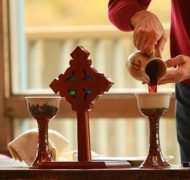Why Holy Week Matters: Letting Go in the Garden
Blog / Produced by The High Calling
Chances are, you won’t have to search long to find something that overwhelms you this week, something that causes anxiety. And Jesus understands what it means to worry.
Second in a three-part series connecting everyday life with scenes from Holy Week: at the table, in the garden, and at the cross.
The scene has become iconic, the subject of sermons and movie scenes, preaching and paintings: Jesus on his knees in the Garden of Gethsemane, sweating it out.
Where does the Garden intersect our story? How do we reach back 2000 years to a time so different from our own, and find the touchpoints that connect us with Holy Week? With these agonizing moments, specifically?
In the garden, Jesus was, in some ways, a hot mess. The text describes him as “sorrowful and troubled,” worried about what he knew was to come. He asked his disciples to pray with him, and they fell asleep, leaving him lonely. He asked God to take the cup from him, and apparently got a divine “no” on that one. If you’ve ever been worried or lonely or felt like your will differed from God’s, you can connect with Jesus in the Garden. Jesus has felt anxious, lonely. He’s wrestled with doubt. Knowing that reassures us and deepens our connection to him.
Let Go of Your Worry
Back in the early days of his ministry, Jesus confidently preached, “do not worry about your life… do not worry about tomorrow, for tomorrow will worry about itself. Each day has enough trouble of its own” (Matthew 6:25, 34). He told his followers to trust in God’s provision for all things, to let go of worry.
Contrast that with his words in the Garden: “My soul is overwhelmed with sorrow to the point of death. Stay here and keep watch with me” (Matthew 26:38).
Do you ever feel worried? Chances are, you won’t have to search long to find something that overwhelms you this week, something that causes anxiety. What is it? Jesus understands what it means to feel worried and overwhelmed. He tells us not to worry, but he was not immune from anxiety. He completely understands and can relate to our anxious hearts.
Let Go of Your Disappointment
In the garden, Jesus asks his disciples, particularly Peter, James and John, to pray with him, to “keep watch.” Jesus makes himself vulnerable, expresses his need for companionship and support. And unfortunately, his disciples let him down.
This week, it’s quite possible that someone will disappoint you, will fail to come through when you need them. You might feel lonely and discouraged. In that moment, think of Jesus, praying in the garden while his disciples snored. He knows, firsthand, what you are experiencing. And he will never let you down.
Let Go of Your Doubt
Another time, Jesus declared: “My food is to do the will of him who sent me and to finish his work. “(John 4:34) and “For I have come down from heaven not to do my will but to do the will of him who sent me.” (John 6:38). Jesus talked over and over about his unity with the Father, his joyful alignment with the will of the Father.
But in the Garden, we see something unique: Jesus’ will and the Father’s will were in opposition. Luke 22:42 records Jesus’ prayer in the garden: “Father, if you are willing, take this cup from me; yet not my will, but yours be done.” This sentence contrasts two things: Jesus will, and the Father’s. It may be the only time in Scripture when Jesus, who was one with the Father, argued for a different story, held an opposing view, wanted something different. Could Jesus have been feeling some doubt in this moment? Could he have been asking some questions like, is this really necessary? Is there any other way to accomplish this? And boldly stating: I’d like another option.
This week, if you run into a situation where you want something different from what you know God wants, or feel a bit of doubt—did God really tell me to do that?—then take a moment to stop. Jesus has been in that same situation. He knows what is it like to wrestle with God, to argue with his Father, to hold the opposite view of things. He voices honest objections, but ultimately, chooses obedience. In his very human response to the promise of suffering, he questioned.
When you question, doubt or even argue with God, know that even Jesus did this, but then showed us the way. He worked through the fears and doubts and came to a place of trust. Following his example, we can do the same.
NEXT: In the third installment of this series, we explore how we can connect with Jesus at the cross.
Keri Wyatt Kent is the author of ten books and co-author of six others. Through her writing and speaking, she helps people grow closer to God and live their faith. Connect with her at http://keriwyattkent.com
Image by Tim Miller. Used with permission. Sourced via Flickr.





